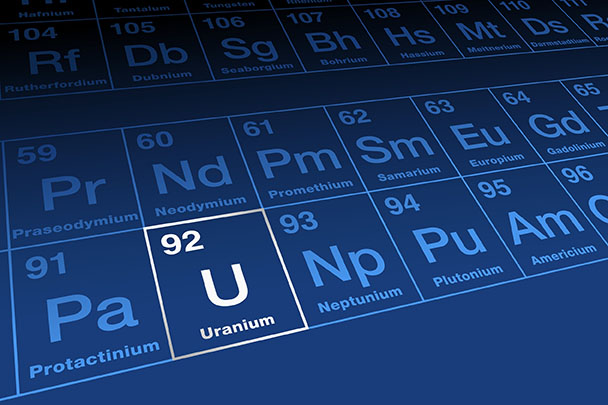

Uranium is a chemical element with the symbol U and atomic number 92. It is a naturally occurring, radioactive metal that is found in the Earth's crust.
Uranium is a heavy metal that is silvery-white in colour. It is a poor conductor of heat and electricity.
Uranium is a fissile element, which means that it can be split into smaller atoms by absorbing neutrons. This process releases a large amount of energy, which can be used to generate electricity or to create nuclear weapons.
Uranium is mined in many countries around the world. The United States, Canada, Australia, and Russia are the leading producers of uranium.
Uranium is a valuable resource, but it is also a dangerous material. It is important to handle uranium with care to avoid exposure to radiation.
Uranium is used to fuel nuclear power plants.

Noun:
Adjective:
The word "uranium" comes from the Latin word "Uranus", which is the name of the Greek god of the sky. The element was named after Uranus because it was discovered in pitchblende, a mineral that was also named after Uranus.
Uranium was first discovered in 1789 by Martin Heinrich Klaproth, a German chemist. Klaproth was studying pitchblende when he found a new element that he called uranium.
Where can you mine for uranium?
Question:
Explain the significance of uranium as a naturally occurring element in the context of nuclear energy. Describe how uranium undergoes nuclear reactions to release energy and the role of nuclear reactors in harnessing this energy. Discuss the potential benefits and challenges associated with using uranium for electricity generation.
Answer:
Uranium is a crucial element in the field of nuclear energy, playing a significant role in electricity generation. One of its isotopes, uranium-235 (U-235), is fissile, meaning it can undergo nuclear reactions that release a tremendous amount of energy. This energy is harnessed in nuclear reactors to produce electricity.
In nuclear reactions, U-235 atoms can be induced to split, releasing energy in the form of heat. This heat is then used to generate steam, which drives turbines connected to generators, producing electricity. The controlled chain reaction in nuclear reactors allows for a controlled release of energy, which is essential for safe and efficient electricity generation.
Using uranium for nuclear energy offers several benefits. It provides a highly concentrated energy source, producing vast amounts of electricity without emitting greenhouse gases. This contributes to reducing carbon emissions and addressing climate change. Additionally, uranium reserves are relatively abundant, ensuring a stable energy supply.
However, there are challenges associated with uranium-based nuclear energy. Radioactive waste disposal poses a long-term concern, requiring safe storage and management. Accidents, such as the Chernobyl and Fukushima disasters, highlight the potential risks and the need for stringent safety measures. Furthermore, uranium mining, enrichment, and reactor operation require careful handling to prevent accidents and ensure non-proliferation of nuclear weapons.
Address
Developing Experts Limited
Exchange Street Buildings
35-37 Exchange Street
Norwich
NR2 1DP
UK
Phone
01603 273515
Email
hello@developingexperts.com
Copyright 2025 Developing Experts, All rights reserved.